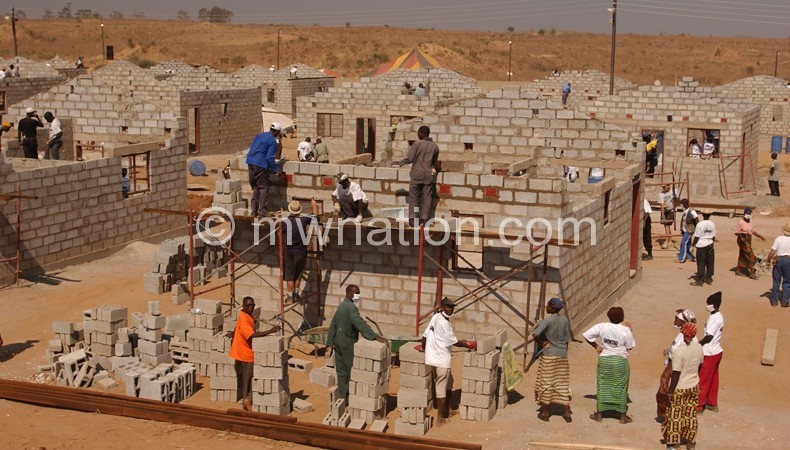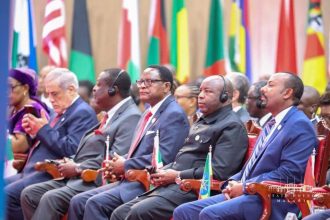Storms and smiles of Sonda
A Mzuzu-based granny, who keeps children orphaned by harsh winds, has acquired a house—thanks to givers who could not stand seeing her become the poorer face of a misfortune often associated with rural settings.
In urban areas, disasters are often played down. At worst, they are reduced to figures for news. But catastrophes happen, making faces of towns’ people as sorry as the typical media portrayals of devastated rural populations.
 Shocking spectacles have happened recently confirming that gone are the times when the only disasters in town were market fires.
Shocking spectacles have happened recently confirming that gone are the times when the only disasters in town were market fires.
With Gogo Ellen Nyashonga and her four grandchildren, Mzuzu dwellers do not have to rely on television visuals of fatal floods which destroyed numerous houses and killed people in Chilobwe Township, Blantyre, to believe that towns and cities are not free from the so-called rural phenomenon.
The gogo, who has seen the world smiling at her after she showed love to the foursome survivors of the tragic heavy winds which killed her daughter on February 28 2011, has been grappling with life after urban disasters for four years.
She is a low-income earner who has been homeless. Nyashonga almost became a beggar when the wall and roof of her house gave in to the harsh winds and fell on the children’s mother.
That fateful day— a pay day— she was at Luwinga where her husband was working as a guard at Trust Academy.
“It looked like a good day until around 4pm when we saw dark clouds as if we were going to get heavy rains. What we got was heavy winds which shattered our home in Kaboko,” Shonga recalls.
A suburb on the margins of Mzuzu, Kaboko overlooks mushrooming mansions, lodges and other glories of Hilltop in Katoto Township.
“When news got me, I panicked. I only understood the gravity of what had happened when my daughter was pronounced dead on arrival at Mzuzu Central Hospital,” says the granny.
That is how the poor granny became the children’s guardian, a sacrifice that has seen little Tiwonge, who was just eight-month-old and suckling at that time, grow into a happy girl who calls her ‘mama’.
“Raising the children will never be easy, but good people have always been there for me,’ she says.
She thanks the New Apostolic Church Shepherd Chirwa and his Masasa South Congregation for always assisting her household with foodstuffs, soaps and other basics since the burial of their sister-in-prayer Elisa.
She also salutes Rockin Msiska, the church’s district evangelist in Mzuzu Central, for using his Save Our Family community-based organisation to persuade Henwood Foundation which has constructed a two-bedroom house for Shonga and the little ones.
On Thursday, the woman was all smiles when the foundation, affiliated to church handed her the house in Sonda, a fast-rising area where aristocratic houses are taking shape every day.
The house has been constructed in conjunction with Habitat for Humanity which envisages homeless people owning safer homes.
“Now the children can afford a decent home,” she added.
Besides, the survivors, who slept on reed mats, can afford good sleep after Nak-karitativ Germany, Henwood’s principals, provided them with beds, mattresses, pillows, chairs, dining tables and other household items.
Henwood board chairperson Patrick Sibale offered deeper insight into the story of togetherness and good neighbourliness.
“There are many people with untold problems. Through the foundation’s partnership with Habitat for Humanity, the beneficiaries qualified for a house to ease their suffering,” says Sibale.
This is a three-year partnership, he says. In the past years, six low-cost houses for vulnerable households have been built in Machinjiri, Blantyre. Construction of two houses is underway in Lilongwe. One more is situated in Nkhata Bay.
“We are happy to work with the foundation towards ensuring that homeless people have decent homes,” says Habitat of Humanity’s representative Steve Makombe.
He saluted the partners for furnishing the house since “a house is nothing without furniture to make life better”.
The foundation has offered the household K100 000 as a business starter-pack to ensure they have a stable source of income.
“All the beneficiaries, except the Nkhata Bay resident, have received business management training and capital of K100 000 each,” says Sibale.
Interestingly, Shonga visited Mzuzu market to appreciate the business acumen of her fellow women, spotted opportunities and where to order things. She is convinced her business ground is not at the hustle and bustle of the city centre, but just outside her new home in Sonda.
This mirrors how the church is fulfilling its obligation to help government uplift the underprivileged, says George Nkhana.





